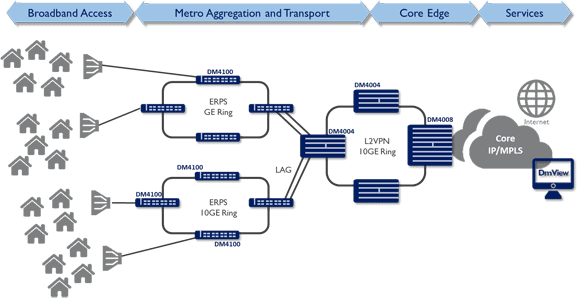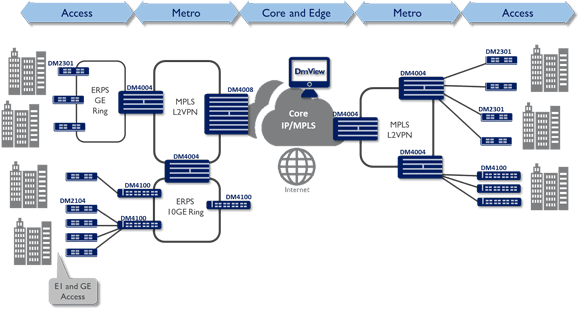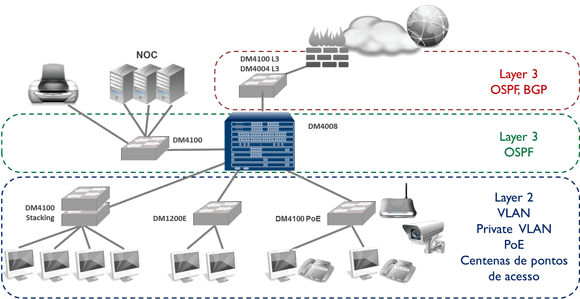The DM4000 product family offers 3 different chassis versions for a wide range of applications in Metro Ethernet and High-end Enterprise networks. Providing 10Gigabit Ethernet and Gigabit Ethernet interfaces with both fiber and copper, as well as E1 and STM-1, it comes up with an advanced redundancy system which ensures a robust and reliable operation.
Operating within different application layers and offering a wide range of protocols, DM4000 switches also have advanced mechanisms such as Quality of Service (QoS), Operation, Administration and Maintenance functions (OAM), Virtual Private Networks (VPN), TDM Circuit Emulation over packets using pseudowires (CESoP/SAToP) and wire speed L2, L3 and MPLS packet switching.
The DM4000 family offers three different chassis models for 19-inch racks, also providing several options for line cards and switch fabric units. Line cards range from Gigabit Ethernet (both copper and SFP) to 10 Gigagit Ethernet, also offering options with E1 or STM-1 interfaces for TDM circuit emulation over packet networks. Switch fabric units are available in two different versions.
Providing redundant DC power input and specific versions with AC power supply, the DM4000 family chassis are a reliable and safe option for high availability networks.
Wire Speed L2, L3 and MPLS
The DM4000 family supports wire speed L2, L3 and MPLS packet forwarding through a hardware-based switch fabric unit of up to 512 Gbit/s.
Management
Centralized management is provided through DMView NMS over Windows™ or Solaris™ platforms, supporting FCAPS model and redundancy. The equipment also provides Command Line Interface (CLI) with automatic syntax help, which is accessible by either Telnet or RS-232 Console . SNMPv1, v2c and v3 and 4 RMON groups are supported. The switch fabric units also provide an out-of-band management port.
It is possible to keep up to 2 firmwares and 10 different configuration profiles simultaneously, choosing which one will be loaded during the equipment initialization.
Security
To guarantee the network security, products of DM4000 family allow a reliable management structure through user authentication, authorization and accounting via RADIUS and TACACS+. They also support alarms notifications, a unique clock via SNTP, protection against Denial of Service (DoS/DDoS) and Syslog (remote and local).
DM4000 family also offer mechanisms of protection against broadcast, multicast and Destination Lookup Failure (DLF).
VLANs
Virtual LANs are fully supported on DM4000, allowing the usage of 4.094 VLANs simultaneously, according to IEEE 802.1q. Double tagging (Q-in-Q) is also supported, allowing the support of Transparent LAN Services (TLS). It is also supported Protocol-based, MAC-based VLANs and port-based VLAN with overlapping.
IP/MPLS networks
The DM4000 product family implements static and dynamic routing (RIPv2, OSPFv2/v3 e BGPv4) as well as the roles of Label Edge Router (LER) and Label Switching Router (LSR) within MPLS networks. Transparent LAN Services (TLS) are implemented through L2 VPN or L3 VPN over MPLS. VPNs are supported in point-to-point (VPWS) and point-to-multipoint (VPLS or H-VPLS).
TDM Circuit Emulation
Designed to meet the applications of legacy services convergence into packet networks, the DM4000 line cards with E1 or STM-1 interfaces implement TDM Circuit Emulation over Ethernet (SAToP and CESoP).
The E1 and STM-1 interfaces present on the equipment are emulated towards Ethernet networks through the use of pseudowires. TDM clock can be recovered through Adaptive Clock Recovery (ACR) mechanism.
QoS
The DM4000 line cards offer 8 queues per physical port, supporting advanced scheduling algorithms which can assure that determined flow is always prioritized accordingly. The products also allow the configuration of queue weights and the maximum allowed forwarding rate for all physical ports. The traffic classification is done according to IEEE 802.1p standard, IP Precedence field, DSCP and TCP or UDP ports. QoS statistics are also provided, allowing full network traffic visibility.
The traffic shaping mechanism provides a granularity of 64kbit/s for Committed Information Rate (CIR) and Peak Information Rate (PIR), and can be applied to either incoming or outgoing traffic.
Ethernet OAM
The DM4000 family supports OAM EFM according IEEE 802.3ah. This allows fault indication, Unidirectional Link e Critical Event. EFM operates with configurable PDU intervals, keeping full interoperability with other equipment vendors.
Additionally this family also support OAM CFM according IEEE 802.1ag and ITU-T Y.1731. Proactive monitoring, continuity check messages and fault isolation through loopback and link trace messages are supported.
Protection Mechanisms
Spanning Tree, including RSTP for shorter convergence times and MSTP for better resource allocation and improved scalability are fully supported, as well as EAPS and ERPS protocols for ring topologies. This allows DM4000 products to be part of Metro Ethernet scenarios supporting automatic protection switching and providing faster service restoration times.
Additionally Link Aggregation static and dynamic (LAG and LACP) are also supported.
DM4000 Modules
DM4008
DM4008 AC
DM4004
DM4004 AC
DM4001
DM4001 AC
DM4000 MPU384
DM4000 MPU512
DM4000 ETH24GX H Series
DM4000 ETH24GX E Series
DM4000 ETH24GX+2x10GX H Series
DM4000 ETH24GX+2x10GX E Series
DM4000 ETH48GX H Series
DM4000 ETH2X10GX H Series
DM4000 ETH4x10GX H Series
DM4000 ETH4x10GX E Series
DM4000 ETH24GT H Series
DM4000 ETH48GT H Series
DM4000 PWE3 ETH16GX+4STM1 H Series
DM4000 PWE3 ETH16GX+2x10GX+4STM1 H Series
DM4000 PWE3 ETH20GX+32E1 H Series
DM4000 PWE3 ETH20GX+2x10GX+32E1 H Series
Considering all the options available for chassis and line cards, the DM4000 family is suitable for IP/MPLS aggregation networks, VPN services offering, mobile backhaul and LAN/Data Center networks.

Aggregation

VPN

Backhaul

LAN